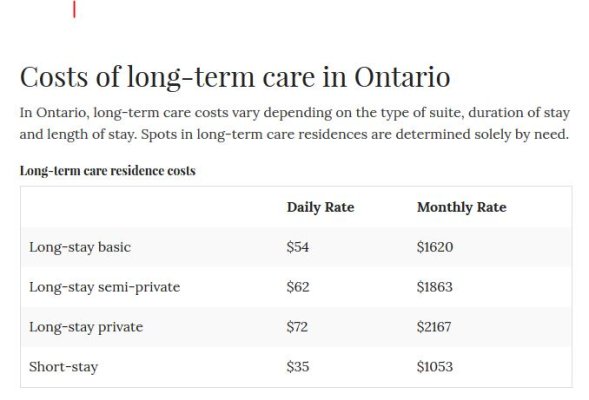What do you suppose it would be like in Canada vs US if one or both transition to long-term care? Probably not something they want to discuss, but it becomes very important for many, later in life. Do you know of any cost comparisons between the countries?
No cost comparisons, but personal experience in Ontario.
My sister and I (both living in the U.S.) were POAs for our bachelor uncle who lived alone in a large suburb of Toronto, Ontario. In the early 2000s, as he was in his late 80s and starting to need assistance with his daily life, we began shopping for assisted living places and eventually long-term care places in his area.
We visited about 6-8 assisted living places...some were small and old and others were large, modern places. At the assisted-living place he chose, he lived in a very nice, bright private 1-BR room with ensuite bath...and the cost was around $2500/mo. (incl. 3 meals/day, bathing assistance, medication administration). The cost was based on a rent-to-income calculation. He had been a LBYM person with a nice little nest egg and small pension plus OAP (like social security in the U.S.) that was factored-in to what he was charged. Others paid less.
As he aged and his health started declining (he was still mobile, but was starting to develop a few issues that required more care), the staff suggested that we start shopping for a long-term care place for him.
We learned that the LTC places there were always full. Openings occurred on a random basis, usually when a resident passed away. You put your name on a list, when an opening occurred you had 48 hours to take occupancy or you lost your spot and it was offered to the next person on the list.
We visited about 5-6 LTC facilities and chose a modern residence that looked to be very well-run. They even had a few pet cats residing there, which made it seem homey. We put our uncle's name on the list. The LTC place called us a few months later when a room became available and we moved him in. He had a very nice private room for ~$2000/mo. He lived there comfortably for a few years before he passed away at age 94.
We made 6-8 unannounced trips a year to visit him and were impressed with the staff and cleanliness at both the assisted living and LTC factility. We had periodic meetings with the doctor and staff. They kept good records on his care and had suggestions for us when he was in need of something (e.g. vision check or dental work). We felt he was well cared-for.
Our parents, who lived in the U.S., lived out their lives in their own condo, so we didn't have any experience with the U.S. equivalents of assisted living and LTC, although we have heard many stories of how expensive they can be.
omni
----
I just found this online:

